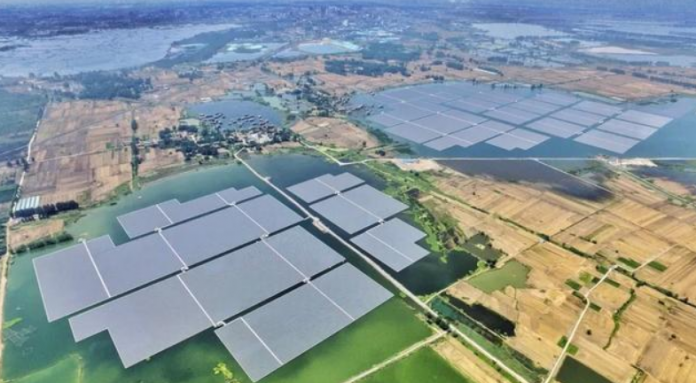State-owned steelmaker Krakatau Steel plans to build a 40 megawatt (MW) floating solar photovoltaic (PV) power station in Banten to power the operations of its water treatment subsidiary, PT Krakatau Tirta Industri (KTI).
KTI signed a US$14 million deal on Monday with energy company Akuo Energy Indonesia, a subsidiary of Paris-based Akuo Energy SAS, to develop the floating station on its water reservoir in Cilegon, Banten. Krakatau Steel president director Silmy Karim said the power station would have a 16 MW capacity by 2022 that would cut power bills by Rp 7.8 billion ($537,352.92) annually. The capacity would be raised to 40MW by an unspecified date. “This partnership is the start of our next business development project in renewable energy with Akuo Energy SAS.
This will generate added value for the Krakatau Steel Group that is in line with improving the competitiveness of Krakatau Steel and its attention to emissions reduction,” Silmy said on Monday, as quoted in a news release. Krakatau Steel booked a US$74.1 million profit in the first quarter of 2020 – its first profit in eight years – after taking several cost cutting measures, including slashing energy bills, reducing spare parts costs and laying off employees.
The steel industry is one of the most pollutive industries in the world, contributing 2.3 gigatons of carbon dioxide (Gt CO2) annually, compared to the chemical industry’s 1.2 Gt CO2 and the cement industry’s 0.8 Gt CO2, according to International Energy Agency (IEA) data.
Krakatau Steel’s planned solar plant is larger than those of many other big companies, including Coca Cola Amatil’s 7.34 MWp solar rooftop in West Java and Danone-AQUA’s planned 15.6MWp solar rooftop in Central Java.
“This agreement can open up horizontal business exploration to develop a [domestic] green steel industry that has a very lucrative market in Europe,” said Akuo Energy Indonesia director Refi Kunaefi in the statement. Akuo Energy SAS has developed 1,400 MW worth of renewable energy in 18 countries, including the United States, France, Poland, Australia, Croatia, the United Arab Emirates, Turkey, Uruguay and Morocco. Indonesia plans to have renewable energy account for 23 percent of the country’s energy mix by 2025, but last year, the share was only 11.51 percent, and many studies predict the country will miss the target.
With the country aiming to increase the use of green energy, state-owned electricity company PLN started developing a 145 MW floating solar plant in West Java in December. It is the largest such facility in the pipeline in Indonesia.






